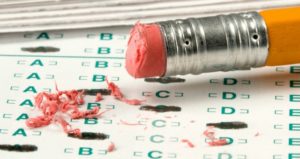
Grading Dilemma: Should We Round Up?
Among the trickiest decisions teachers make is whether to round up the final grade for a student who is just a few points shy of a passing score.
Although some students need a “second lap” to master academic skills needed for later coursework, repeating courses makes it harder for students to progress toward a degree. Time is money (literally, in higher education), and when students are asked to spend more of both on a class they already took, they may get discouraged or drop out. This is a consequence we need to take seriously, as nearly half of students do not complete a bachelor’s degree in four years.












